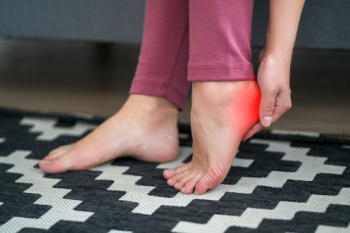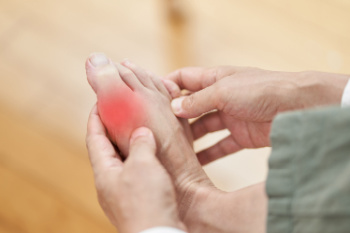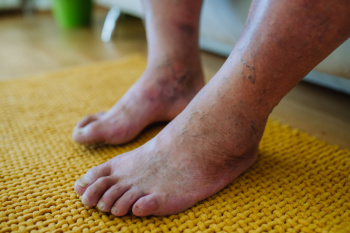Connect With Us
Blog

Bone spurs are growths that can develop on the heel, the top of the foot or the toe. On the heel, they often form gradually, creating discomfort that can interfere with daily activities. Symptoms include sharp pain when standing up in the morning, aching after long periods of walking, and tenderness at the bottom of the heel. A heel spur may appear on imaging as a small hook-like projection, but it may not be visible from the outside, making the internal sensation of pressure or stabbing pain the most noticeable sign. Causes commonly include high impact activities or osteoarthritis. A podiatrist begins with a thorough evaluation that may include imaging studies to confirm the diagnosis. Treatment options include custom orthotics, stretching programs, footwear guidance, or targeted anti-inflammatory care. For persistent cases, advanced treatments may also be considered. If you are dealing with heel pain, it is suggested that you make an appointment with a podiatrist for a diagnosis and treatment plan.
Heel spurs can be incredibly painful and sometimes may make you unable to participate in physical activities. To get medical care for your heel spurs, contact one of our podiatrists from Save Your Soles. our doctors will do everything possible to treat your condition.
Heels Spurs
Heel spurs are formed by calcium deposits on the back of the foot where the heel is. This can also be caused by small fragments of bone breaking off one section of the foot, attaching onto the back of the foot. Heel spurs can also be bone growth on the back of the foot and may grow in the direction of the arch of the foot.
Older individuals usually suffer from heel spurs and pain sometimes intensifies with age. One of the main condition's spurs are related to is plantar fasciitis.
Pain
The pain associated with spurs is often because of weight placed on the feet. When someone is walking, their entire weight is concentrated on the feet. Bone spurs then have the tendency to affect other bones and tissues around the foot. As the pain continues, the feet will become tender and sensitive over time.
Treatments
There are many ways to treat heel spurs. If one is suffering from heel spurs in conjunction with pain, there are several methods for healing. Medication, surgery, and herbal care are some options.
If you have any questions, please feel free to contact our offices located in Abington and Willow Grove, PA . We offer the newest diagnostic and treatment technologies for all your foot care needs.

Gout is a form of inflammatory arthritis that occurs when uric acid crystals build up in a joint, most commonly at the base of the big toe. It often begins suddenly and causes intense pain, swelling, redness, and warmth that can make even light touch uncomfortable. Risk factors include obesity, high blood pressure, kidney disease, and diabetes, all of which can increase uric acid levels in the body. Gout attacks may recur if the underlying cause is not addressed. A podiatrist can evaluate the affected joint, confirm the diagnosis, and create a personalized plan that may include lifestyle guidance, footwear changes, and targeted treatments to reduce inflammation. If you have symptoms of gout, it is strongly suggested that you are under the care of a podiatrist who can help you to manage this painful condition.
Gout is a foot condition that requires certain treatment and care. If you are seeking treatment, contact one of our podiatrists from Save Your Soles. our doctors will treat your foot and ankle needs.
What Is Gout?
Gout is a type of arthritis caused by a buildup of uric acid in the bloodstream. It often develops in the foot, especially the big toe area, although it can manifest in other parts of the body as well. Gout can make walking and standing very painful and is especially common in diabetics and the obese.
People typically get gout because of a poor diet. Genetic predisposition is also a factor. The children of parents who have had gout frequently have a chance of developing it themselves.
Gout can easily be identified by redness and inflammation of the big toe and the surrounding areas of the foot. Other symptoms include extreme fatigue, joint pain, and running high fevers. Sometimes corticosteroid drugs can be prescribed to treat gout, but the best way to combat this disease is to get more exercise and eat a better diet.
If you have any questions, please feel free to contact our offices located in Abington and Willow Grove, PA . We offer the newest diagnostic and treatment technologies for all your foot care needs.

Diabetic feet can reveal a great deal about overall health, especially when they feel unusually cool, look enlarged, or develop rough, flaky skin. Changes in temperature may point to circulation concerns, while altered sensation can be related to nerve function. A puffy appearance around the feet or ankles often reflects fluid buildup, which may occur after long periods of standing or sitting, or in connection with vascular, heart, or medication-related issues. Skin that feels tight or irritated may signal reduced moisture, impaired blood flow, or environmental exposure. These signs often appear together because circulation, nerves, skin, and soft tissues are closely connected. If these changes are persistent, uncomfortable, or worsening, it is suggested that you see a podiatrist who can help identify the cause and guide appropriate treatment.
Diabetic foot care is important in preventing foot ailments such as ulcers. If you are suffering from diabetes or have any other concerns about your feet, contact one of our podiatrists from Save Your Soles. our doctors can provide the care you need to keep you pain-free and on your feet.
Diabetic Foot Care
Diabetes affects millions of people every year. The condition can damage blood vessels in many parts of the body, especially the feet. Because of this, taking care of your feet is essential if you have diabetes, and having a podiatrist help monitor your foot health is highly recommended.
The Importance of Caring for Your Feet
- Routinely inspect your feet for bruises or sores.
- Wear socks that fit your feet comfortably.
- Wear comfortable shoes that provide adequate support.
Patients with diabetes should have their doctor monitor their blood levels, as blood sugar levels play such a huge role in diabetic care. Monitoring these levels on a regular basis is highly advised.
It is always best to inform your healthcare professional of any concerns you may have regarding your feet, especially for diabetic patients. Early treatment and routine foot examinations are keys to maintaining proper health, especially because severe complications can arise if proper treatment is not applied.
If you have any questions, please feel free to contact our offices located in Abington and Willow Grove, PA . We offer the newest diagnostic and treatment technologies for all your foot care needs.

